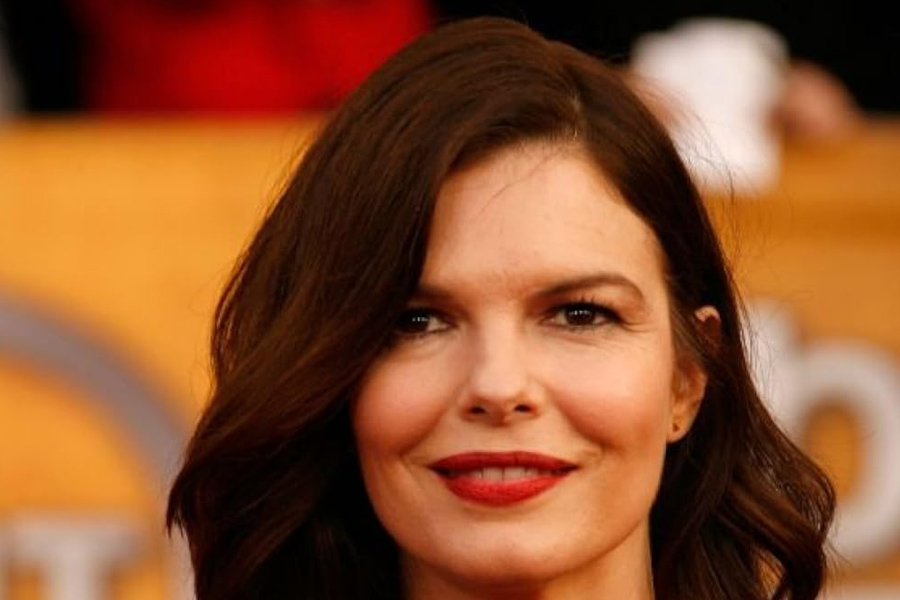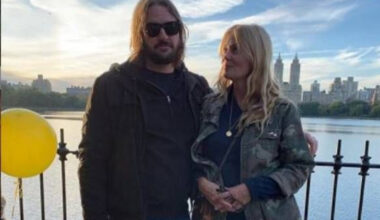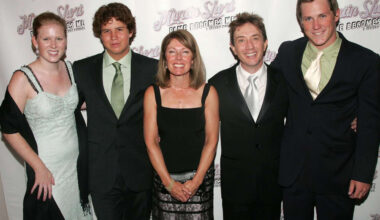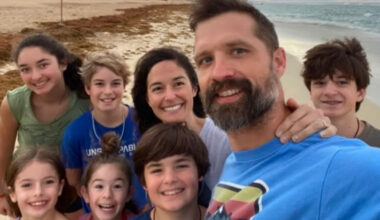Basic Information
| Field | Detail |
|---|---|
| Name | Jean Tripplehorn |
| Also known as | Jeanne Tripplehorn |
| Birth name | Jeanne Marie Tripplehorn |
| Born | June 10, 1963 — Tulsa, Oklahoma, USA |
| Education | Juilliard School, Drama Division (Group 19) |
| Occupation | Actress (film, television, stage) |
| Years active | 1982–present |
| Notable works | Basic Instinct (1992); The Firm (1993); Waterworld (1995); Big Love (2006–2011); Grey Gardens (2009); Criminal Minds (2012–2014); Mrs. America (2020); The Gilded Age (2022–); The Terminal List (2022) |
| Spouse | Leland Orser (m. 2000) |
| Children | 1 — August Tripplehorn Orser (b. 2002) |
Early life and training
Jean Tripplehorn’s story begins in Tulsa, Oklahoma, where she grew up amid music, local television, and the kind of midwestern sturdiness that later grounded her most nuanced performances. Early on, she logged hours on Tulsa TV programs and worked at rock radio station KMOD, learning how to hold an audience’s attention before she ever stepped onto a Hollywood set. That discipline deepened at the Juilliard School’s Drama Division (Group 19), a crucible where technique and temperament are sharpened side by side. The training shows: from her first major roles onward, Tripplehorn’s choices have a stage actor’s precision and a film actor’s restraint.
Breakthrough on screen
In 1992, she arrived in a big way with a supporting turn in Basic Instinct, a modern thriller that demanded calculated stillness and nerve. One year later, The Firm positioned her opposite Tom Cruise as Abby McDeere, a partner both skeptical and steadfast, bringing ballast to a high-velocity legal thriller. By 1995 she was navigating the epic currents of Waterworld. The late 1990s widened her range—romantic drama in Sliding Doors, pitch-black comedy in Very Bad Things, and urbane charm in Mickey Blue Eyes—each performance stamped with an intelligence that makes even the quiet beats feel charged.
Television, awards, and a second act
Like many performers with stage roots, Tripplehorn found an expansive second act on television. From 2006 to 2011, she anchored HBO’s Big Love as Barbara Henrickson, a portrait of faith, duty, and the private negotiations of a public marriage. In 2009, her work in Grey Gardens earned an Emmy nomination, a nod to her ability to refract history through empathy instead of mimicry.
The 2010s brought a mainstream network turn on Criminal Minds (2012–2014) as Dr. Alex Blake, a role that highlighted her clinical precision and unshowy authority. The 2020s marked a fresh surge: the acclaimed limited series Mrs. America; a richly textured presence in The Gilded Age; and a commanding performance as Secretary of Defense Lorraine Hartley in The Terminal List (2022), where her steel-edged calm suggested a lifetime spent making decisions with consequences. These later roles underscore her hallmark—quiet intensity that hums beneath the dialogue like a tuned string.
Family roots and relationships
Behind the spotlight, a tight-knit family story threads through her life. Tripplehorn’s father, Tom Tripplehorn, worked as a musician, and that creative pulse is evident in the family’s arc. Her mother, Suzanne Ferguson, kept the Tulsa roots strong during jean’s early years. After her parents’ separation when she was young, that sense of dual belonging—between past and possibility—inflected her early choices and later poise.
In 2000, she married actor and director Leland Orser. The partnership reads like a creative equilibrium: two working actors balancing craft, schedules, and the rhythms of a public profession with the privacy needed for real life. Their son, August Tripplehorn Orser, was born in 2002, and family life has remained a quiet throughline—supportive, present, and wisely offstage.
Public profiles consistently note a brother, Jason, who has appeared with her at events. Other sources sometimes list additional siblings, including Kelly and Daniel, though public references vary. What remains clear is that Tripplehorn’s family—parents, partner, son, and siblings—forms a small, resilient constellation around a career built on steadiness rather than spectacle.
Family snapshot
| Name | Relation | Notes |
|---|---|---|
| Tom Tripplehorn | Father | Musician; early creative influence |
| Suzanne Ferguson | Mother | Tulsa roots; early family anchor |
| Leland Orser | Spouse | Actor/director; married in 2000 |
| August Tripplehorn Orser | Son | Born 2002 |
| Jason (Tripplehorn/Ferguson) | Brother | Publicly referenced at events |
| Kelly Tripplehorn | Sibling | Sometimes listed in public profiles |
| Daniel Tripplehorn | Sibling | Sometimes listed in public profiles |
Style and craft
What makes Jean Tripplehorn’s performances linger isn’t volume, it’s voltage. She specializes in the weight of small decisions—the pause between question and answer, the look that completes a sentence. On screen, she often inhabits roles where moral clarity is earned, not assumed: the spouse who keeps a secret, the professional who knows when to bend a rule, the official who understands power’s price. Directors lean on her as a tone-setter; scene partners rely on her as a steady hand. She brings the patience of the stage to the pace of film and television, and that hybrid rhythm—controlled but alive—gives her characters a life beyond the frame.
Selected timeline
| Year | Milestone |
|---|---|
| 1963 | Born in Tulsa, Oklahoma (June 10) |
| Early 1980s | Local TV and radio work in Tulsa; early on-air experience |
| Mid–Late 1980s | Trains at Juilliard (Drama Division, Group 19) |
| 1992 | Breakout film role in Basic Instinct |
| 1993 | Stars in The Firm |
| 1995 | Leads in Waterworld |
| 1998–1999 | Key late-’90s films: Sliding Doors; Very Bad Things; Mickey Blue Eyes |
| 2000 | Marries actor/director Leland Orser |
| 2002 | Son, August Tripplehorn Orser, is born |
| 2006–2011 | HBO’s Big Love (Barbara Henrickson) |
| 2009 | Emmy nomination for Grey Gardens |
| 2012–2014 | Criminal Minds (Dr. Alex Blake) |
| 2020 | Mrs. America |
| 2022– | The Gilded Age; The Terminal List (Secretary Lorraine Hartley) |
Work and longevity
Sustaining a decades-long screen career requires more than talent; it demands selection, adaptation, and presence. Tripplehorn’s choices show a clear pattern: projects with texture, characters with an inner engine, ensembles where she can calibrate dynamics instead of overpowering them. Over more than 30 years, she has moved nimbly between prestige cable, network procedurals, and streaming dramas—a modern map for durability in the industry. The result is a filmography that reads like a conversation across eras: early ’90s thrillers in dialogue with 2000s prestige TV, culminating in the sharp, high-stakes dramas of the 2020s.
Frequently cited roles and what they reveal
- The Firm (1993): Trust under pressure, the art of partnership on screen.
- Big Love (2006–2011): Interior conflict rendered with quiet defiance.
- Grey Gardens (2009): Historical empathy over imitation.
- Criminal Minds (2012–2014): Professional rigor without coldness.
- The Terminal List (2022): Calm authority with shadows at the edges.
- The Gilded Age (2022–): Social nuance, coded conversations, and the power of reputation.
FAQ
What is Jean Tripplehorn best known for?
Her signature work spans The Firm, Waterworld, HBO’s Big Love, and later roles in The Terminal List and The Gilded Age.
Where was she born and when?
She was born on June 10, 1963, in Tulsa, Oklahoma.
Where did she train as an actor?
She studied at the Juilliard School’s Drama Division (Group 19).
Is Jean Tripplehorn married?
Yes, she married actor and director Leland Orser in 2000.
Does she have children?
Yes, one son: August Tripplehorn Orser, born in 2002.
Which recent shows feature her?
She appears in The Gilded Age and plays Secretary of Defense Lorraine Hartley in The Terminal List.
What defines her acting style?
Measured intensity, emotional precision, and an ability to convey high stakes with subtle choices.



